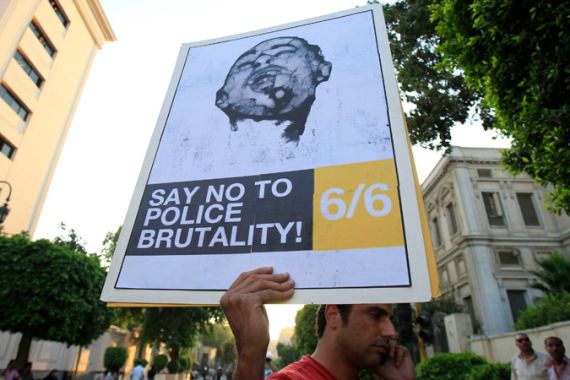Egyptians protest security officers’ release
Relatives block highway to Suez after court orders release of 10 policemen charged with killing protesters.

 |
| Activists say they are unhappy with the pace of justice in the aftermath of the Egyptian uprising [Reuters] |
Hundreds of people have attacked a courtroom in Cairo, the Egyptian capital, after 10 policemen charged with killing protesters during the country’s uprising were ordered released.
The protesters scuffled with security guards and blocked a major highway for several hours after the court order on Monday.
The latest unrest means that tensions remain high, with activists and demonstrators alleging that the ruling supreme military council has not been holding security forces involved in killing protesters accountable.
Nearly five months after Hosni Mubarak, the former president, was forced to quit, only one policeman has been convicted of being involved in the deaths, of which there were more than 846.
Mahmoud Abdel-Meguid, the country’s prosecutor-general, ordered the court order overturned after the riots broke out.
Amin Ramez, a lawyer for the victims’ families, however, said that the move was “illegal”, because the prosecutor-general has no authority over the court.
“They are trying to deceive the people to pacify them,” said Ramez. “The policemen are now at army headquarters seeking protection. If people saw them, they would tear them apart.”
Ali al-Ganadi, the father of one of the victims, said that Abdel-Meguid had promised him that the court order would be annulled and the officers would be put back in jail.
Highway blocked
Some relatives of protesters who were killed blocked traffic on the highway that runs from Cairo to Suez for at least six hours, leaving hundreds of cars lined up on the road. The case in which the officers were being tried involved protesters killed in Suez.
Ramez spoke to the Associated Press news agency by telephone from a point on the Cairo-Suez road, about 100km outside of Cairo, saying that truck drivers and residents had joined the protesters.
Later, military officers negotiated with the demonstrators, and a few hours after nightfall al-Ganadi, who is a spokesman for the Suez victims’ families, said the protesters were reopening the road.
They moved from the highway to inside the city of Suez. Ahmed Khafagi, one of the protesters, said that traffic was halted in two of Suez’s main squares and that thousands of people were taking part in the protest.
Fresh protests planned
The 14 policemen had been charged with killing 17 people and injuring more than 350 in Suez during the 18-day uprising, which ended on February 11 with Mubarak’s forced exit.
Seven of the officers were released on bail, and their trials were postponed to September 14. Three of the officers are being tried in absentia.
Suez was a flashpoint of violence during the Egyptian uprising, with many deadly confrontations taking place between the tens of thousands of protesters and security forces.
Ramez said that the court had over the last four sessions rejected the families’ lawyers’ demands that 41 more policemen be added to the case.
“We provided them with footage and visual evidence that show those policemen holding guns and automatic weapons and hunting down the protesters as if they were hunting birds,” he said. “But the judge didn’t summon them.”
“The spark of the revolution came from Suez and the second revolution will also come out of Suez,” Ramez said.
Activists have called for protests on Friday against the perception that justice is not being delivered at the appropriate pace. Mahmoud Ibrahim, a member of the April 6 youth group, which was one of those that led the uprising in Suez, said that residents of the city were planning on turning out in force for the Friday rallies.
The Egyptian government has sought to calm tensions by announcing the creation of a fund to assist the victims’ families, which it says will be worth about $16 million.